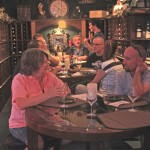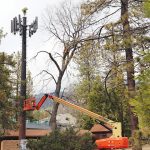As Idyllwild took shape and acquired its unique culture between 1920 and 1960, three developers played central roles. Two are well-known.
Claudius Lee Emerson controlled downtown and lower Strawberry Valley until 1936 and Frank Strong and George Dickinson’s firm continued to develop Fern Valley and South Ridge into the post-war era.
The third, Gerald “Jerry” Johnson, arrived on the scene in 1928 in his early 20s. Despite being plagued by tuberculosis, which would contribute to his early death at 56, he was a long-distance bicycle racer who even ran a marathon from San Jacinto up to Idyllwild.
Johnson soon met and married high-spirited teenager Eleanor Poates, a daughter of Anna “Ma” Poates, who had moved here in 1925 and ran the popular Rustic Tavern at the end of Cedar Street. Jerry joined Eleanor’s brothers, Vic and Lem Poates, in the construction business, but then got into real estate, setting up an office across from the Idyllwild Inn tennis courts on Cedar at North Circle.
Emerson’s 1936 bankruptcy put the extensive Idyllwild Inc. holdings in the hands of absentee owners throughout Idyllwild’s wartime decline, but Johnson started accumulating downtown property.
January 1946 brought his big opportunity, when Dr. Paul Foster needed to make a quick sale. Johnson and two partners formed the Idyllwild All-Year Resort Co. to acquire the newly opened Idyllwild Mountain Inn, as well as the water company, stables, Village Market, Rustic Tavern and Theatre, 48 rental cabins, 320 acres of raw land,and 150 subdivided lots, including the abandoned site of the burnt-down Idyllwild Inn.
Emerson’s historic log cabin real estate office in the heart of the village became Johnson’s base of operations. Just across the street lay the inn site, which Eleanor considered an eyesore.
Though preoccupied with a busy social life and three (going on four) children to raise in their creeskside home at South Circle and Village Center, she decided to beautify that bare spot for the community’s benefit. During 1949-1950, she planned, financed and then maintained what became known as Eleanor Park in her honor.
Jerry hardly fit the stereotype of a rapacious developer. For example, when the Idyllwild Dairy sought to buy a parcel that bordered Camp Maranatha, he refused to sell because he believed a herd of grazing cows would detract from campers’ experience. Instead, he sold the land to the camp at a deep discount.
He stocked the water company’s Foster Lake with trout for public fishing. He donated the land for Town Hall and an adjacent community campfire site. He offered creekside land to the Chamber as a public recreation site and Eleanor Park to the county, provided it would assume maintenance and add restrooms.
Through the 1950s, Jerry was a guiding force in the Lions Club and the Chamber of Commerce. But when his underlying health problem took its toll, he turned over his business to his elder son, Jim, dropped out of public view and soon passed away. Only a remnant of the Johnson conglomerate remains in the family today.










